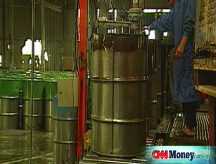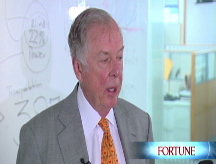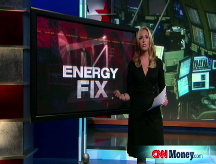Pickens urges action on energy crisis
Oilman turned wind guru tells Congress that his plan would reduce the nation's dependency on foreign oil by 38%.
NEW YORK (CNNMoney.com) -- Texas oilman T. Boone Pickens told Congress Tuesday that the government must act quickly to curb the nation's dependence on foreign oil.
"Our country is in a deep hole and it's time to stop digging," said Pickens, founder and principal of BP Capital, in testimony before the Senate Homeland Security and Governmental Affairs Committee.
"We have walked into a trap and we are the ones that put ourselves there," he said. "I'm not pointing the finger at anybody because it isn't going to help, but we have to work together to get out of it."
Earlier this month, Pickens unveiled a plan to curb America's dependence on foreign oil through increased investment in domestic renewable resources such as wind, and through use of natural gas as an alternative transportation fuel.
Pickens said his plan would reduce the nation's dependency on foreign oil by 38%.
Sen. Joseph Lieberman, I-Conn., the committee's chairman, praised Pickens' plan, calling it a "classically American message of can-do optimism."
"The high price of gas today is literally wounding America and causing the American economy to stagger," Lieberman said.
"I'm spoiling for some bold T. Boone Pickens-like action," he added.
The nation imports nearly 70% of its oil, Pickens said, spending $700 billion a year on those imports. Many of the countries supplying that oil are "not friendly" to the United States, he added.
"I am convinced that we are paying for both sides of the Iraqi war," Pickens testified.
If the nation fails to adapt to the changing energy landscape the crisis will only worsen, he added.
"If we continue to drift the way we have been, you're going to be importing 80% of your oil and it's going to be $300 a barrel," over the next 10 years, Pickens told Lieberman.
What's more, the cost of implementing energy alternatives, such as the ones Pickens has advocated, "pales in comparison" to the current spending on oil imports, he said.
Harnessing wind energy is a key component of the Pickens Plan.
Wind energy can be used as a replacement for energy derived from natural gas, which is currently used for heating purposes, Pickens said.
The spared natural gas can then be used as a replacement for gasoline as a transportation fuel, according to the plan.
"Natural gas is cheaper and cleaner than gas," Pickens said. Shifting to natural gas "gives us time to develop the next generation of alternative fuels."
Gal Luft, executive director of the Institute for the Analysis of Global Security, took issue with the idea that natural gas is a viable alternative to gasoline for transportation, telling the committee that it is a "spectacularly bad idea."
He said that 63% of the world's natural gas reserves are under the control of Russia, Iran, Qatar, Saudi Arabia, and the United Arab Emirates.
Luft said these countries are in the process of developing a "natural gas cartel" that will rival the Organization of the Petroleum Exporting Countries (OPEC).
"We don't want to shift from one resource that we don't have to another resource that we don't have," Luft said. "And we don't want to give, at this time, a gift to Iran."
Luft said that OPEC's reluctance to increase oil production is the "main culprit" behind the energy crisis.
Instead of increasing domestic drilling, Luft urged Congress to promote the use of flex-fuel vehicles.
He argued that alternative alcohol-based fuels such as ethanol and methanol - which can be made from biomass, coal, natural gas and urban trash - will help "break OPEC's monopoly."
Pickens expressed support for the controversial idea of drilling for oil in environmentally sensitive areas like the Alaskan National Wildlife Reserve and the outer continental shelf. But he added that opening these areas to drilling is not a complete solution to the country's energy problems.
Luft also disagreed with this idea. "When we drill more, OPEC drills less," he said. ![]()





